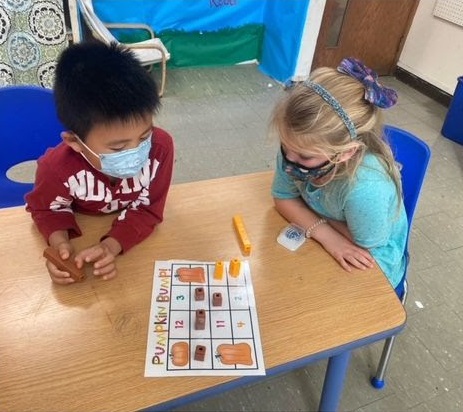Grade 1 Curriculum
Overview of Grade Level Goals and Developmental Milestones
First-graders are eager to show and share what they know! Ideas and opinions abound in a Cambridge Friends School first-grade classroom and students enjoy sharing their thinking about their passions. Dramatic play themes are elaborate and reflect their growing understandings of the world. While sitting still for long periods of time can be challenging; movement and physical play in the CFS first-grade classroom continue to support the first grader’s ability to focus. Our hands-on projects are great vehicles for learning new information in first grade and students learn well through games, chants, and songs. As students work, an interest in developing skills and technique for their own sake begins to emerge.
Fairness is important to first graders. Being right is important and can sometimes be the source of frustration or worry. Our classroom rules and routines help to provide security and structure, supporting first graders in their efforts to organize their work and play. In grade one, students are working to develop friendship skills. They practice using words and actions that appropriately and effectively convey their needs and wants. Students continue to practice resolving conflicts with physical and verbal grace. They continue to develop language to self-identify race, religion, and family structure and learn to honor each other’s stories and ideas.
English and Language Arts
CFS first-graders benefit from opportunities to engage in meaningful literacy work. Reading, writing, speaking, listening, and phonics skills are integrated across the academic curriculum and support children in their efforts to solve problems and understand content. Students work individually, in small groups, and as a whole class to learn and practice strategies for decoding printed words, accessing text, and communicating through writing and drawing.
During language arts blocks, students practice using language to convey their ideas and share their knowledge with others. They practice speaking in front of a group and leading activities and routines. The development of active listening skills supports their ability to make meaningful connections between their own experience and the ideas introduced and shared by others. Reading and writing instruction takes place in a workshop format, where specific skills, strategies, and concepts are introduced and modeled, after which students move on to apply them. Practice with phonological/phonemic awareness, phonics, and spelling skills are addressed through the Wilson Fundations® Program. Fundations® activities help children with a range of experience to build a foundation for reading and spelling within a structured, sequential, multi-sensory program.
By the end of the school year, these are some of the skills that we expect CFS first-grade students will have developed:
- Read text fluently, with speed, accuracy, expression and phrasing at Fountas and Pinnell Literacy™ level J
- Apply multiple strategies when reading
- Demonstrate comprehension of texts, identifying key elements, and retelling stories or main ideas
- Use upper and lower case letters appropriately in words and sentences
- Use ending punctuation marks appropriately in sentences
- Spell using grade-appropriate knowledge of phonics and phonological awareness when writing
- Use conventional spelling of high frequency and sight words
- Write in different genres, including: personal narratives, fiction stories, non-fiction reports, and poetry
- Incorporate details into writing, such as sensory details in personal narratives, plot elements in fiction stories, poetic devices in poetry, and facts in nonfiction reports
- Use information from other sources to improve the accuracy and logic of a written piece
Math
The CFS first-grade math program is designed to engage students in making sense of mathematical ideas and focuses on developing student mastery of skills in the three major areas of mathematical learning: concepts, solution strategies, and the language of math. Emphasis is placed on reasoning about mathematical ideas and students are supported in their efforts to communicate their thinking and knowledge in a variety of ways including verbal explanations, recording work, and in their use of manipulatives and other materials.
With the TERC Investigations® at the core of our math program, students focus on the development of strategies to support their problem-solving efforts in the following areas including: number and operations (whole numbers), geometry, patterns and functions, data collection and analysis, and measurement. As in other curricular areas, the math program strives to differentiate instruction so that students in need of additional challenge, support to go deeper, or help with reinforcing skills and concepts may each receive scaffolding as needed.
By the end of the school year, these are some of the skills that we expect CFS first-grade students will have developed:
- Rote count to 120 by ones and groups (especially by tens)
- Understand basic ideas of number composition and place value
- Compose and decompose 2-digit numbers and represent them as the sum of multiples of ten and some number of ones
- Solve addition and subtraction numeric and word problems up to ten using multiple strategies
- Identify shapes in the environment. Build, draw, compare, compose, and decompose 2D and 3D shapes
- Understand that halves and fourths are wholes divided into two and four equal parts
- Accurately compare the lengths of two objects indirectly by using a third length
- Demonstrate accurate measuring techniques when measuring an object or distance
- Represent and describe a set of data with two or three categories
- Solve comparisons problems using survey data
Social Studies
The first-grade social studies curriculum begins with an exploration of identity. Students develop their understanding of identity in the context of family, community, and history. Through this study, they grow to appreciate differences and commonalities, develop language to articulate their identities, and begin to see the role they can play as change-makers and supporters of an anti-bias mindset.
In their focus on the American Civil Rights Movement, Cambridge Friends School first graders work to broaden their understanding of oppression and resistance. They learn about the lives and work of leaders and allies of the past and will be supported in making connections to ongoing work today.
Geography studies include an exploration of maps and landforms. Students learn about map features and practice reading and creating 2D and 3D representations of places both real and imagined.
In our final unit of study, students look at honoring our ancestors. Students revisit themes from earlier in the year work to make connections between the change-makers we have learned about and the people who they know in their lives who make a difference every day. Through this study, students see that people of inspiration are all around them and that to become one themselves is an achievable goal.
By the end of the school year, these are some of the skills that we expect CFS first-grade students will have developed:
- Broader understanding of oppression through the study of the American Civil Rights movement
- Working knowledge of geography to help orient themselves in their own community
- Understand Quaker Principles by studying Nobel Peace Prize Winner Wangari Maathai
- Draw simple inferences on how the present is connected to the past
Science
Cambridge Friends School first-graders are actively involved in tending to the school garden – improving the soil, planting and harvesting, preparing and eating food, and observing plants and insects. In their life and earth science work, students investigate different components of soil and explore the science of composting, both indoors and out. They study organisms that live in soil and compost and become experts on the life cycle of earthworms and honeybees. They study seeds and fruits, focusing on the growth and development of plants and methods of seed dispersal.
Physical science experiences focus on the structures and properties of matter and may include work with liquids, changes with temperature, and developing formulas for paste and creating a new beverage. In their engineering work, students solve challenges such as designing and constructing seed packages to travel as far as possible, then apply this thinking as they design and test blades for a larger windmill engineering project.
By the end of the school year, these are some of the skills that we expect CFS first-grade students will have developed:
- Ask questions about the natural world and seek answers through active investigation
- Make logical predictions, building on prior experiences
- Use tools appropriately to enhance observations and to gather information
- Use drawings, labels, and numbers to record observations and to help in explaining processes or ideas
- Include reasons or evidence to support scientific arguments or conclusions
- Demonstrate understanding of concepts, facts, and vocabulary during class discussions, in written work, and in project/lab work
Some specific goals for each unit:
Earth Science: Soils and Compost
- Conduct tests to discover unique properties of different soil components
- Gain an understanding of the process of decomposition and development of soil
- Engage in ongoing service work as they collect compost, share information with classrooms, and maintain the school compost bins
Life Science: Seeds, Soil Organisms, and Life in the CFS Garden
- Gain a basic understanding of structure and function, as well as the life cycle of soil and garden organisms, including bees and worms
- Know the basic parts of seeds and how they help plants germinate and grow
- Gain a sense of the enormous diversity of seed and fruit structures
- Design and test seed models that travel using strategies used by seeds in nature
Physical Science: Working with Liquids
- Use a thermometer to read and record temperatures in degrees Celsius
- Refine accuracy of predictions with repeated experience
- Offer reasonable explanations for the outcomes of investigations
- Use tools and strategies to accurately measure ingredients for “secret formulas” and keep an accurate record of amounts when recording formulas for experiments
Technology/Engineering: Structures and Windmills
- Create structures that can meet a given goal: ex. tallest possible tower, slowest possible marble chute
- Determine best materials, shape, and size for a sail to move a sled along a track
- Use information gained from building sails to create blades for a windmill that can lift a small load
Art
The first-grade art curriculum at Cambridge Friends School helps growing artists build the skills and understanding of concepts and materials introduced in earlier grades. Students build their growing repertoire of understanding of the differences between similar materials, such as tempera and watercolor paint. First grade projects begin to carry an idea through several working sessions or processes towards completion. Our first-grade students begin to form plans for their projects before tackling their ideas. Projects cultivate the use of imagination, encourage self-expression and build students’ self-confidence.
By the end of the school year, these are some of the skills that we expect CFS first-grade students will have developed:
- Mix primary colors to make secondary colors
- Experiment with layering washes of watercolor to “mix” colors
- Draw abstractly, focusing on line, pattern, and composition
- Cut, fold, and manipulate paper to make 2D collage or 3D sculptural compositions
- Combine tactile, sensory objects with drawing and painting
- Practice the under-over pattern of the basic running stitch used for sewing and embroidery
- Learn how to utilize building techniques with clay for specific projects, such as coils and slipping/scoring, as well as experimenting as they build
- Build their understanding of the properties of clay (thickness, dry/wet, etc.) in order to adjust their building strategies
- Conceptualize their ideas in three dimensions, thinking about form, shape, and the negative space around the shapes
- Experiment and solve problems involving weight, balance, and design while creating buildings with recycled materials
Physical Education
Grade one physical education builds on skills learned in earlier grades, and students are introduced to specific activities designed to develop aerobic fitness, strength, and flexibility. Warm-up routines alternate between loco-motor patterns, rhythmic movement and fitness activities. Core units include a plethora of large group games, parachute activities, scooter play, eye-hand coordination, activity stations, rolling, bouncing, and throwing games that involve a variety of materials. Fitness evaluations are used to measure each child’s aerobic fitness, flexibility, strength, and speed. Baseline data is collected in the fall, and retesting is done in the spring to measure progress.
By the end of the school year, these are some of the skills that we expect CFS first-grade students will have developed:
-
-
- Able to take calculated risks during group activities
- Exhibit improved self-confidence
- Able to focus and complete assigned fitness routines
- Demonstrate fair play and sportsmanship within a game setting
- Show increased endurance, flexibility, and upper body strength during fitness routines
- Demonstrate developing underhand, overhand, tossing, throwing, dribbling, kicking, goal-tending, and striking skills in a variety of individual, partner, and small group activities
-
Music
First-grade students at Cambridge Friends School come to music class once a week for forty-five minutes. Students continue to engage in music through singing, movement, song games, listening, improvisation, and playing classroom instruments. First-graders are introduced to the elements of music, including rhythm, melody, harmony, and notation through a shared repertoire. First-graders also prepare songs for performances in assemblies including: Pride, Dr. Martin Luther King, Jr., and Significant Elders’ Day.
By the end of the school year, these are some of the skills that we expect CFS first-grade students will have developed:
- Sing songs from a varied repertoire (representing diverse musical traditions and forms including echo and call and response) with others
- Familiarity listening to a variety of musical genres
- Echo rhythmic patterns using voices, pitched and non-pitched percussion instruments, including long and short durations
- Recognize and perform musical contrasts (e.g. fast/slow – tempo, long/short – duration, loud/quiet – dynamic)
- Keep a steady beat to familiar melodies or rhythms
- Respond to rhythm, melody, and musical quality through movement
- Practice active listening
Library
The first-graders come to the library once a week. At Cambridge Friends School, children learn about fiction, nonfiction, folklore, authors, illustrators, and the essential elements of stories. During each class, two or three stories, which are linked thematically, are read and discussed.
We read traditional folktales such as Jack and the Beanstalk and then an alternative look at the same story – The Giant and the Beanstalk. This is a wonderful opening to talk about fairness and point of view. We also read books about school, holidays, and families. Part of each library time is set-aside for the students to browse in the library and sign out books.
By the end of the school year, these are some of the skills that we expect CFS first-grade students will have developed:
- Understand and discuss traditional folklore and how these stories reflect outdated ideas about behavior and society, and that other books offer alternative story lines and characterizations
- Understand significant cultural observances, such as Hispanic Heritage Month, GLBT Book Month™, Banned Book Week, and National Poetry Month
- Appreciate and understand the customs and beliefs in the school community and in the world
- Familiarity with many kinds of books, authors, and illustrators



